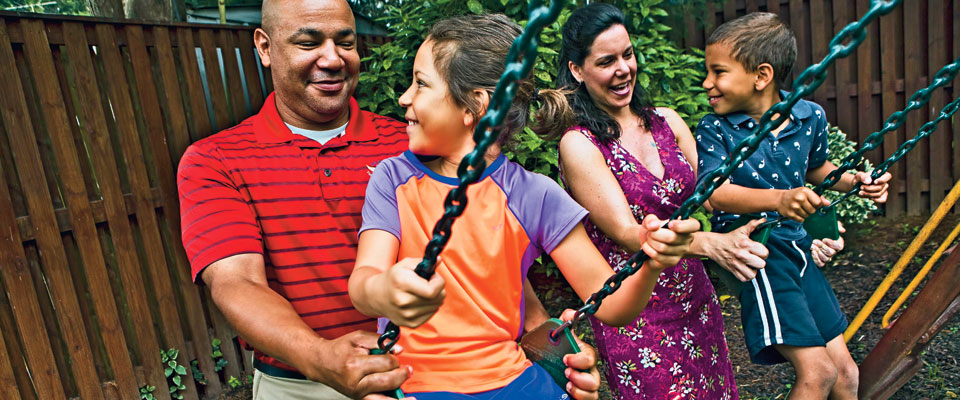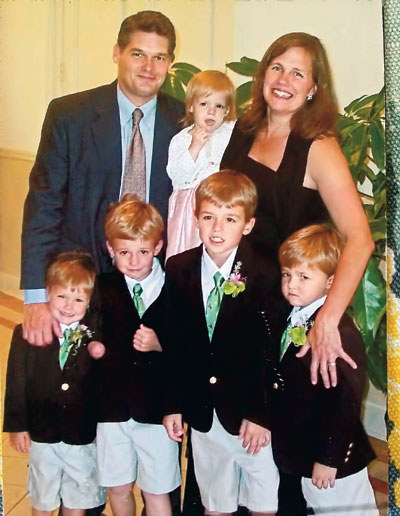All in the Balance

Bill Paul ’93 (L-R), Zoe, Holly Paul ’94, and Quincy enjoy an afternoon together. Photo by Jeffrey MacMillan.
by Kathleen Parrish
Holly Helgerson Paul ’94 and her husband, Bill Paul ’93, had a decision to make when their son turned 3 and aged out of the childcare center at the private school where Bill was a science teacher.
They considered hiring a live-in nanny, as well as putting him in full-time daycare, but in the end opted for Bill to quit his job and stay home with their son, Quincy, and then 6-year-old daughter, Zoe, while Holly continued working as director of human capital for PwC.
“It seemed more logical for me to stay home, especially since education doesn’t pay as much as the private sector,” says Bill, who considered himself the “de facto” primary caregiver at that point anyway, due to the late-night meetings and extensive travel required of Holly for her job.
“College is for finding a calling, or many callings, including the callings of friendship and love.”
— CAROLYN A. MARTIN, President, Amherst College*
Five years later, the couple still says it was the best decision they ever made. “Having a parent who is relaxed and calm and in control and able to get things done …” says Holly, who is now chief human resources officer for Vocus, a marketing software company. “We are a good example that life choices come in all forms and that our choice to reverse traditional family roles can and does work. And to think it all started at Lafayette where we met and began dating!”
Discovering purpose comes from being self-aware and understanding what we value and consider important, says Meghan Masto ’03, assistant professor of philosophy, noting the liberal arts education at Lafayette is a great starting point for figuring that out because the College offers a smorgasbord of academic opportunities and activities.
Masto, whose research focus is the philosophy of mind, taught a First-Year Seminar on happiness two years ago. She says positive psychology is a relatively new fi eld of study, but research suggests meaningful work and high-quality interpersonal relationships are important components of one’s happiness or life satisfaction, a concept that takes into account more than mood when evaluating a person’s emotional state.
Originally believing she would major in psychology at Lafayette, Masto took a philosophy course and found her passion. “I fell in love with theorizing and the justice of economic distributions,” says Masto, who wrote an honors thesis that opened doors to graduate school.
“I never would have found philosophy if I hadn’t been encouraged to explore other disciplines. I’m incredibly grateful for that.”
MAKING CHOICES
When it comes to striking a happy life balance, there is no one model that is right for everyone and no approach that is right for every life stage, says Jamila Bookwala, professor of psychology, who has focused some of her studies on marital relationships using middle-aged and older adults and whose study on the psychological health of unmarried adults over the age of 40 made national headlines in 2009.
Ultimately, families have to do what works best for them, a construct that depends on the partners knowing themselves and understanding the factors that contribute to their sense of well-being. That’s because balance alone doesn’t guarantee happiness, says Bookwala. Communication and a respect for each other’s career goals are as important, if not more, than dividing responsibility for children and chores. “If you’re balancing and your marriage is suffering, then it’s not a good balance.
“Taking ownership of how your life unfolds and develops; that’s the key to happiness,” she says.

Phillip Dehne ’93 (left) and Tanuja Dehne ’93 play Monopoly with their children Jack (L-R), Alex, Usha, Lucca, and Maceo. Photo by Roy Groething.
Tanuja Majumdar Dehne ’93, an attorney, is senior vice president of human resources for NRG Energy Inc., Princeton, N.J. Her husband, Phillip Dehne ’93, is professor of history at St. Joseph’s College. They have five children. She says she learned to multitask while at Lafayette where she double majored in international affairs and anthropology & sociology, served as a resident adviser, and worked several part-time jobs. She was a member of crew and a tutor for inmates at Northampton County Prison. “It was a lot of juggling, but it forced me to manage my time,” she says, a skill that serves her well as an executive and mother of children ages 10, 9, 5, and 2-year-old twins.
Mornings can be hectic, Tanuja admits, and the couple relies on their older children to help around the house and get the younger ones ready for school and daycare. “We expect them to be a little more self-reliant,” she says. “They know they have to clear the table after meals, load the dishwasher, pack lunches, and entertain the little ones when I go upstairs to get ready for work,” she says.
Once they’re all out the door, the complexities of navigating the schedules of five active children, three of whom play sports, begin. During the spring, her two oldest sons play baseball and have practice or a game every day after school and Saturday. Tanuja usually works late Tuesday and Wednesday, so Phillip will take the boys to baseball, and she’ll pick them up, even if it means leaving a meeting early, so her husband can grab the other children and make dinner.
“We have challenges every day,” she says, “but we have mutual respect for each other and each other’s career. I’m not going to say we’re perfect at this, but we talk to each other, text, and email. There’s no right answer; I live by the hour.”

Peter Austen and Mary Stengel Austen ’86 with their children at a family wedding.
Mary Stengel Austen ’86 and her husband, Peter Austen, have five children. She prefers the term “seesaw” to “balance,” saying chopping one’s life into equal pieces
isn’t realistic.
“There are moments when your child is sick and work takes a second to that, and other days there’s a major client pitch or work crisis and your family comes second,” says Mary, co-founder, president, and chief executive officer of Tierney Communications of Philadelphia, one of the mid- Atlantic region’s largest communications agencies. “You have to make those calls as you go. And sometimes you have to give yourself a break.”
For Mary, that means accepting imperfection and not trying to control the outcome of every situation. “You have to give up some of that to survive,” she says. “Maybe the house is not going to be perfect every day or the kids aren’t going to be perfectly dressed. You’re not going to be perfectly dressed. But that’s OK and it’s normal.”
Peter is CEO of Willis Group Marine Division, an insurance brokerage fi rm, and serves on the boards of the Academy of Natural Sciences and the World Affairs Council. Mary, a Lafayette trustee, also serves on the boards of Greater Philadelphia Chamber of Commerce, Main Line Health, Alex’s Lemonade Stand Foundation, United Way of Greater Philadelphia and Southern New
Jersey, and the Girl Scouts of Southeastern Pennsylvania.
Mary credits Lafayette for teaching her that all work and no play makes Mary a dull girl, or at least a frazzled one. Being a resident adviser, sorority member, campus tour guide, and volunteering at a soup kitchen served as restorative counterpoints to the rigors of academia. It is a lesson she continues to employ in her life today. “There was a sense of work hard, play hard, the notion of ‘I know I need to get my work done, but I also want to connect and have relationships.’”
What’s not copacetic, she says, is the idea that work/life balance pertains only to women. “I do believe it’s about families. There are so many women in the business world these days,” she says. “No one asks my husband how he does it with five kids, but he’s got to figure it out. Many, many people will say to me, ‘How do you do it?’”
It’s a relevant point when considering 70 percent of children live in a home where all of the adults work, and dual-earner households outnumber breadwinner-homemaker households nearly three-to-one, says Susan Averett, professor of economics, whose research is focused on health economics and the connection between relationship status and health. Her work on birth order and adolescent risk-taking led to an appearance on the Today Show and was featured in The Boston Globe, Wall Street Journal, and other media.
“The last time we passed legislation involving work/life was the 1993 Family Medical Leave Act, which allows unpaid leave for up to three months to care for a newborn, adopted child, or parent,” she says. “There is a misguided belief that family is a private sphere, and if you choose to have kids, it’s a private choice and you should bear the cost because only you derive happiness from it.”
That needs to change, says Averett, referencing the work of Nancy Folbre, an economics professor at University of Massachusetts-Amherst, who argues that children should be viewed as a public good in the economic sense because they are the workers and taxpayers of the next generation.
“It really does take a village,” says Averett.
And one that isn’t beholden to traditional gender roles and stereotypes, says Bill Paul, a biology graduate and former teacher and dean, The Holton-Arms School, Bethesda, Md. A member of Lafayette’s 1992 Patriot League Championship football team, Bill says being a Division 1 athlete developed leadership skills, confidence, and a strong sense of self. These attributes allow him to take in stride the sometimes surprised stares he receives from women when he shows up at his children’s schools to volunteer, not only as the lone guy but a “big hulking African American” one. “There’s usually a pause,” he says. “It’s not a big deal.”
Still, if he had a few minutes with current players he says he would tell them not to get caught up in “what society may be telling you about what you, as a male, or your wife should be doing. If you think that the man should be the breadwinner and the woman should stay home with the children, you’re going to have issues down the line. The world doesn’t function like that anymore.”
In his free time, Bill works as an official at local high school football games and is vice president of the Washington District Football Officials Association. He also plays golf with other stay-at-home dads in his neighborhood, comprised of many international families. “It seems very common and acceptable to them” that their wives work and they take care of the kids, he says.
As more men are saying they want to be more involved in raising their children and more women are just as likely as men to pursue challenging careers, the work/life conversation will continue, presenting new opportunities and challenges for both sexes.
It all comes back to choice and knowing what gives you purpose, says Holly, whose involvement in “a little bit of everything” at Lafayette allowed her to discover early on that she is happiest when busy and productive. An anthropology and sociology major, she worked part-time jobs, was a member of Delta Gamma sorority, and played intramural flag football.
“There was always so much to do and so many great people,” says Holly. “I think I learned to live the life I now lead at Lafayette.”
* Source: “How to Assess the Real Payoff of a College Degree,”by Scott Carlson, April 22, 2013, Chronicle of Higher Education.